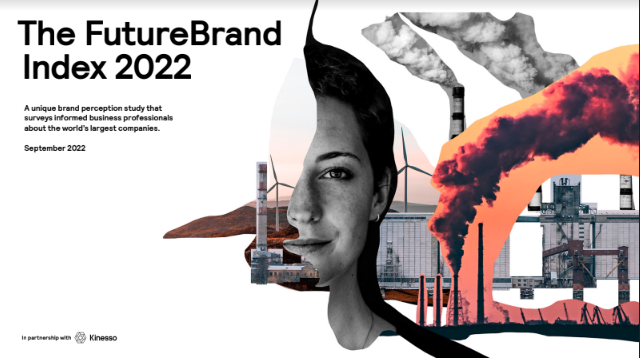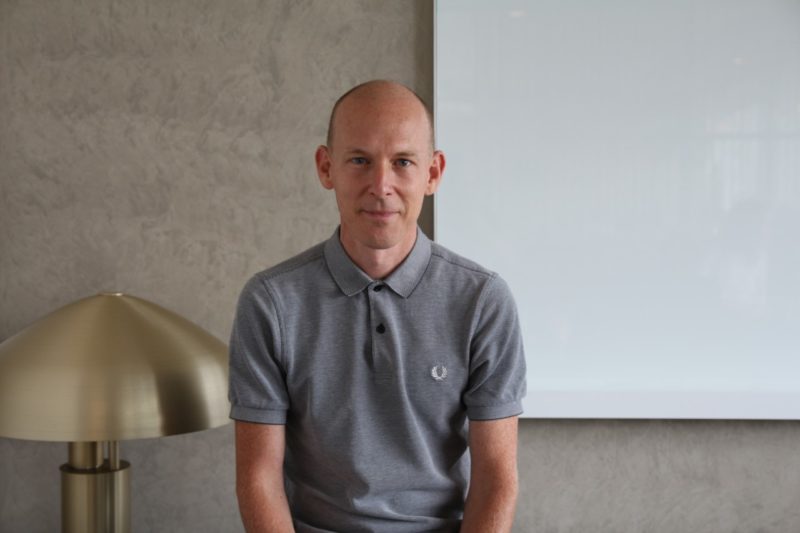2022 FutureBrand Index: B2B brands pushing for a sustainable future take top spots
The results of the 2022 Futurebrand Index have landed, revealing – perhaps unsurprisingly – sustainability has become a key driver of innovation, with climate change now seen as the fastest-growing threat to business success.
The annual perception study of PwC’s top 100 companies saw a number of shifts in the three years since the start of the pandemic, with B2B brands, and particularly those in the East, that are focusing on innovation around green energy and sustainable solutions dominating the top five.

The study uses 18 indicators that provide the most relevant signals of success to reorder PwC’s Glop Top 100 Companies based on perception strength rather than financial strength, with a global sample of over 3,000 professionals. The study was conducted in partnership with FutureBrand’s global research partner QRi Consulting between Monday 20 June and Monday 4 July.
The top five has seen a number of changes since the last study, with NextEra Energy the only company remaining from the previous year, taking out the top spot. Coming in at the second spot for this year’s index is clean energy giant NextEra, followed by Indian conglomerate Reliance Industries and electric battery innovator CATL.
Surprisingly, Meta has also experienced a significant increase in perception following its rebrand in late 2021, making its entry into the top five, climbing 44 place from #49 to #5. Australia’s Commonwealth Bank has also re-entered the list for the first time since 2018. At the same time, Apple has fallen from the top five for the first time since FutureBrand began its research, now in seventh position.
Compared to last year, there have been a number of shifts in the opposite direction, with Walmart (#39) and McDonald’s (#40) climbing back up the ranking as was predicted in the 2021 report, while Amazon (#31) and LVMH (#47) have both seen a decline.
FutureBrand found five key insights from this year’s index:
-
Building a more optimistic and resilient future: This year’s FutureBrand Index reveals that in a world of uncertainty people are looking to those who are building a clear and confident future. Not only do the Top 5 Risers all score well on resilience, but equally over-index on mission and innovation.
-
Putting people first: A renewed focus on people is evident, with all organisations seen to be ‘moving ahead’ driven by their positive contribution to ‘people’s wellbeing’. A company that respects and enhances people’s lives is also a top driver for attracting talent.
-
ESG goes mainstream: ESG is now well and truly part of our collective consciousness. As the public becomes increasingly savvy around corporate commitments to ESG, our findings demonstrate that it’s one thing to join the conversation but quite another to practise what you preach.
-
Purpose in practice: Now, more than ever, our professional respondents are saying that it’s not enough for a company to say it has a meaningful purpose and will take action – it must be seen to fulfil its promises, to be fair and honest, to support the community, and to actively contribute to society. In this world, experience has never been more important, as those brands seen to be ‘moving ahead’ all excel in this real-world domain.
-
B2B branding has never been more exciting: Following in the overarching trend of last year’s FutureBrand Index, this year’s Top Five is largely led by ‘behind-the-scenes’ infrastructure companies, NextEra Energy, Reliance Industries, CATL and Tata Consultancy Services. At the forefront of future innovation, these players are solving the world’s biggest problems by creating the platforms on which human life is maintained and enhanced.

Rich Curtis, CEO, FutureBrand
On the implications of the 202 FutureBrand Index for business and brands, Futurebrand Australia CEO Rich Curtis commented: “With all the instability and uncertainty in the world, it’s never been more important that we study and understand what it takes to transform brands so businesses grow. This latest edition of the FutureBrand Index highlights how the strongest brands are perceived to be ‘moving ahead’ as a result of focusing on people’s wellbeing and inspiring change for the better. Consequently, it’s no coincidence that these brands are solving our world’s biggest challenges.
“What’s more, we’re seeing B2B brands continue their upward trend, once again leading the way – eight out of the Top Ten in this year’s Index are B2B brands perceived to be at the forefront of the innovations that will shape our future. BHP is a good example of an Australian B2B brand benefitting from a strong vision and clear future focus. It’s these attributes that will make BHP highly resilient if and when a recession hits our local economy, a key benefit of building a strong brand. So too it’s reassuring to see Commonwealth Bank grow its market capitalisation to re-enter PwC’s Top 100 Companies and this financial growth is testament to the increase in the strength of its brand perceptions.
“Year-on-year, our research tells us that brands are created with purpose but they’re ultimately defined by the everyday experience. By strengthening that connection, your brand gives your business a measurable competitive advantage – so that more people will want to work for or buy from you.”

Victoria Berry, head of strategy, FutureBrand
FutureBrand Australia head of strategy Victoria Berry added: “With the benefit of almost a decade of FutureBrand Index data to draw from, it is increasingly clear that what it takes for brands and businesses to become future-proof is constantly evolving. What was once all about delivering consistency across every touchpoint is now a question of demonstrating agility and adaptability to suit the needs of your customers and employees alike.
“It’s in these moments that matter that brands and businesses are able to establish the foundation of trust that’s critical to building competitive advantage. It should come as no surprise that trust is the number one driver for people wanting to work for or buy from a brand, and we’ve all seen how this has intensified the fierce competition for talent and the put pressure on organisations to live and breathe their employee value proposition, authentically and credibly.




Have your say